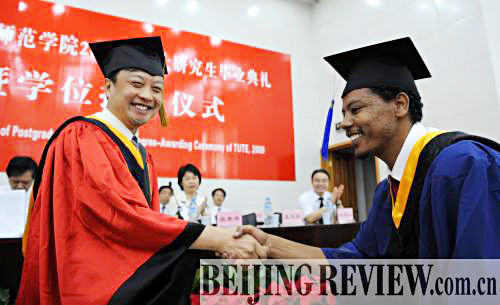|
 |
|
CROSSING CONTINENTS: An Ethiopian student shakes hands with Meng Qingguo, President of the Tianjin University of Technology and Education, after receiving a master's degree on June 14 (WANG YEBIAO) |
Could China become a model for growth and poverty reduction? Increasingly, many in Africa are beginning to believe that this could be the case.
"Less than four decades ago, development indicators for China were no different from those of many African countries," said Fred Jachan-Omach Mandir, Ugandan Minister of State for Finance, Planning and Economic Development.
Most notably, he commended the remarkable economic and social transformations China has undergone over the past 30 years. Poverty rates, for instance, fell from 65 percent in 1981 to only 4 percent in 2007, Mandir said.
Many African countries, on the other hand, still face an upward struggle when it comes to reducing poverty despite the outpouring of global development assistance.
"Common denominators" between the world's fastest developing country and the continent with the largest number of developing countries are needed so that the latter can catch up, he told representatives from China, Africa and industrialized nations at a recent seminar in Beijing.
Jointly hosted by the International Poverty Reduction Center in China and the Development Assistance Committee of the Organization for Economic Cooperation and Development (OECD), the event focused on developing partnerships for growth and poverty reduction between China and Africa.
At a time when Western donors stumble to find ways to provide aid effectively, China could become a driver of development assistance in Africa with its increasing engagement, experts said.
A new stakeholder
Africa has traveled a long and winding path to lift itself out of poverty. In fact, after gaining independence in the 1960s and early 1970s, African countries enjoyed a brief period of sound development. While roads and hospitals were built, social programs such as education and health care also improved, which delivered benefits to the majority of African people, wrote Firoze Manji and Sanusha Naidu in their paper titled "The African Perspective on the Kinds of Development Partnerships China Is Forming in Africa."
Manji is executive director of the non-profit organization Fahamu and editor-in-chief of Pambazuka News, a pan-African electronic weekly newsletter published by Fahamu. Naidu is director of research of Fahamu's Emerging Powers Program.
The two researchers also pointed out these gains were soon to be reversed. As Western donors foisted a series of structural adjustment programs on African countries, including cutting social investment, freezing investment in infrastructure, opening the market for goods and capital from developed countries and selling off public goods to private enterprises, Africa found itself poorer than ever.
Many African countries, moreover, are now suffering from a drain of national wealth because of the huge debts they owe to Western donors.
Against this backdrop, they wrote, China has moved in, providing Africa with assistance without political preconditions while showing an eagerness to invest in infrastructure.
| 